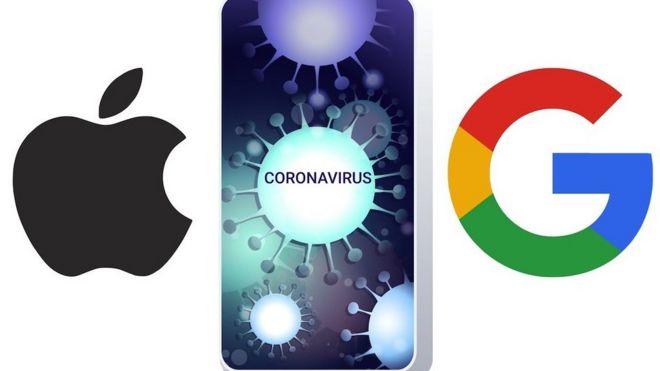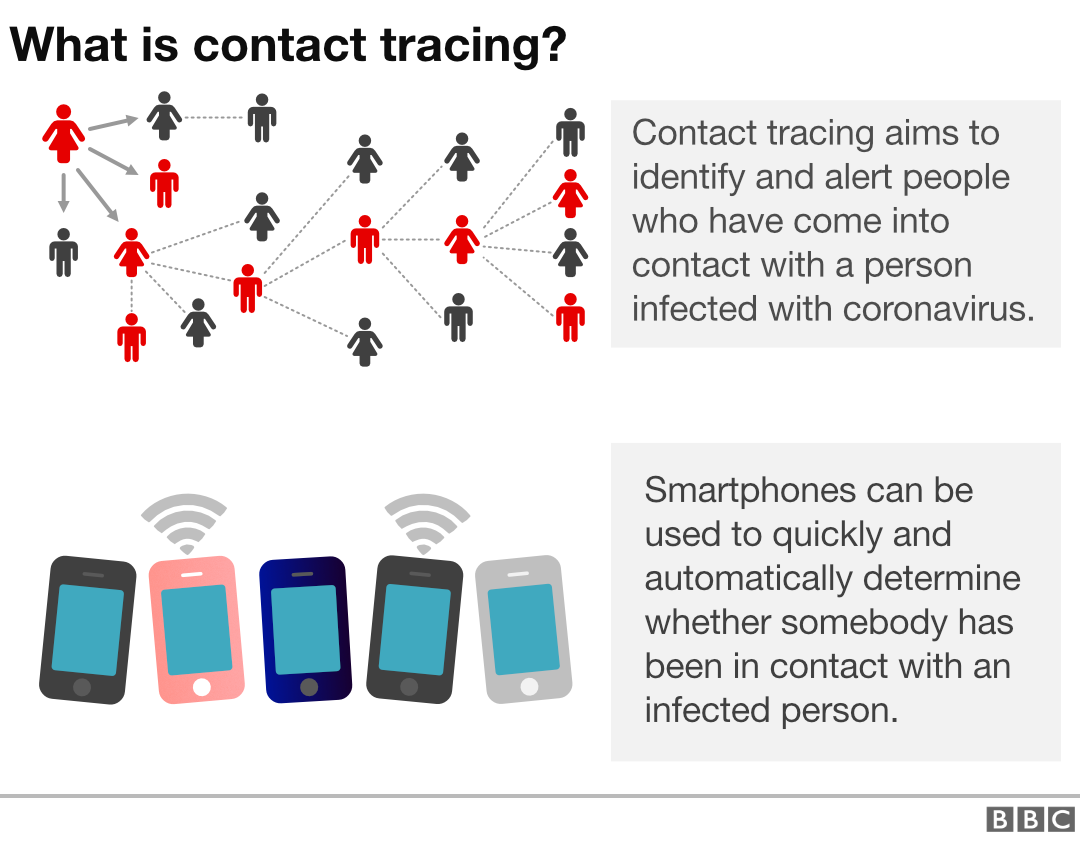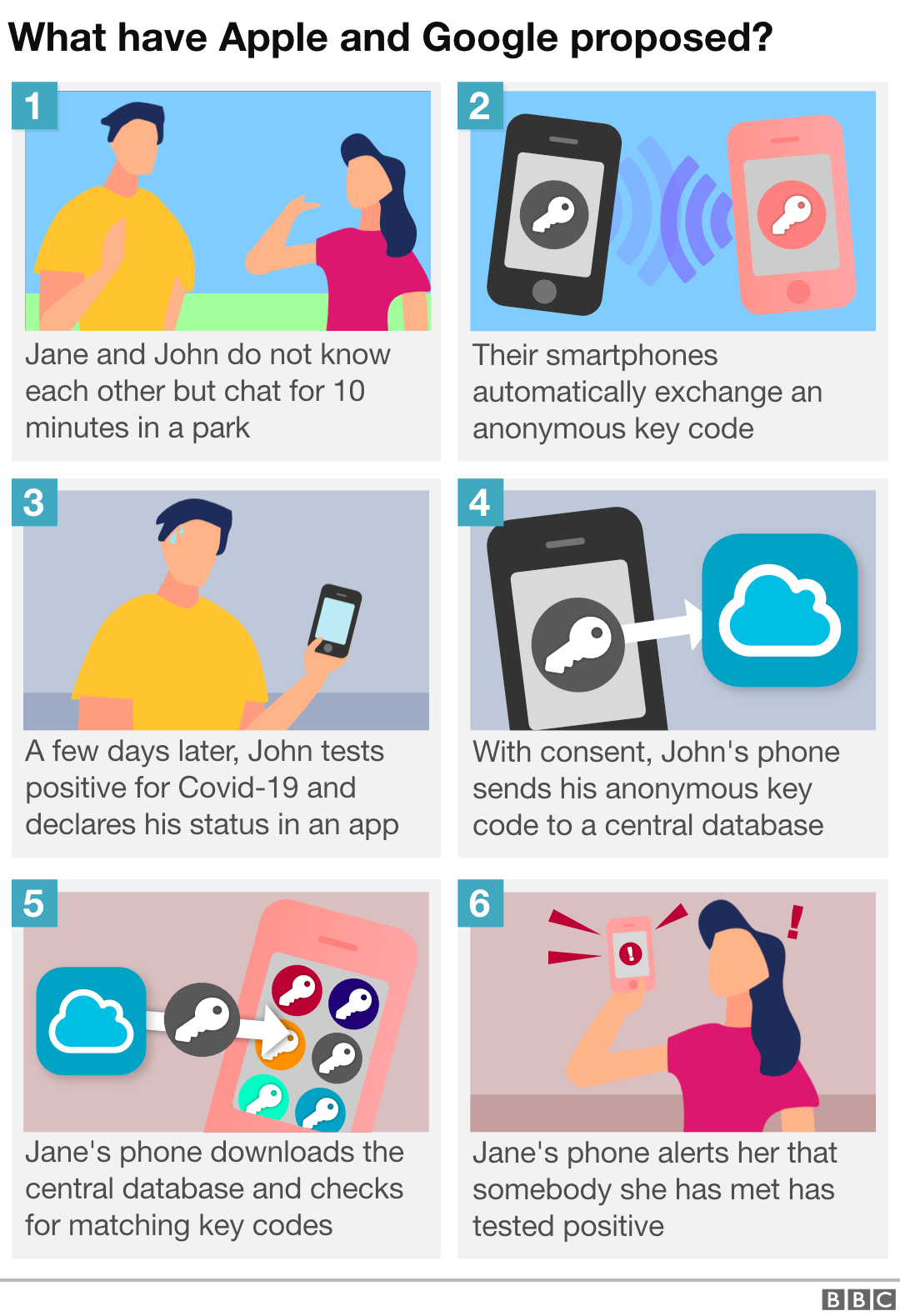
- A new phone-based technology to detect COVID19 contacts is being developed by Apple-Google in partnership.
- A third of world’s population can be monitored by this without disclosing their private information.
- The contact tracing technology will be available in both iOS and Android handsets and would allow people to anonymously exchange information from health department run apps.
- Whenever a COVID19 user adds his data to the public health app others will be notified.
- EU Data Protection Supervisor has said it needs further assessment. the US authorities are taking their time to evaluate while other experts believe in testing support to it.
- Countries like South Korea have already shown the success of this kind of tracing system when coupled with testing.
A BBC report highlights how Apple and Google are jointly developing a technology to alert people if they have recently come into contact with other people infected with coronavirus.
What is it?

According to a TIME magazine report, Apple Inc. and Google unveiled a rare partnership to add technology to their smartphone platforms that will alert users if they have come into contact with a person with COVID-19. People must opt into the system, but it has the potential to monitor about a third of the world’s population.
The technology, known as contact-tracing, is designed to curb the spread of the novel coronavirus by telling users they should quarantine or isolate themselves after contact with an infected individual.
The Silicon Valley rivals said on Friday that they are building the technology into their iOS and Android operating systems in two steps. In mid-May, the companies will add the ability for iPhones and Android phones to wirelessly exchange anonymous information via apps run by public health authorities. The companies will also release frameworks for public health apps to manage the functionality.
What does it mean?
The TIME magazine report goes on to illustrate what does it mean by tracing.
This means that if a user tests positive for Covid-19, and adds that data to their public health app, users who they came into close proximity with over the previous several days will be notified of their contact.
This period could be 14 days, but health agencies can set the time range.
The second step takes longer. In the coming months, both companies will add the technology directly into their operating systems so this contact-tracing software works without having to download an app. Users must opt in, but this approach means many more people can be included. Apple’s iOS and Google’s Android have about 3 billion users between them, over a third of the world’s population
A Third Party Contract Tracing?
They hope to initially help third-party contact-tracing apps run efficiently.
But ultimately, they aim to do away with the need to download dedicated apps, to encourage the practice.
A Voluntary Anonymous Solution
The two companies believe their approach – designed to keep users, whose participation would be voluntary, anonymous – addresses privacy concerns.
Their contact-tracing method would work by using a smartphone’s Bluetooth signals to determine to whom the owner had recently been in proximity for long enough to have established contagion a risk.
If one of those people later tested positive for the Covid-19 virus, a warning would be sent to the original handset owner.
No GPS location data or personal information would be recorded.
Administration Considering It?
“Privacy, transparency and consent are of utmost importance in this effort and we look forward to building this functionality in consultation with interested stakeholders,” Apple and Google said in a joint statement.
“We will openly publish information about our work for others to analyse.”
President Trump said his administration needed time to consider the development.
“It’s very interesting, but a lot of people worry about it in terms of a person’s freedom,” he said during a White House press conference.
“We’re going to take… a very strong look at it, and we’ll let you know pretty soon.”
Why is it important?
The pandemic has killed almost 100,000 and infected 1.62 million people. Governments have ordered millions of people to stay home, sending the global economy into a vicious tailspin. Pressure is building to relax these measures and get the world back to work. Contact-tracing is a key part of this because it can help authorities contain a potential resurgence of the virus as people resume regular activities.
Will It Work?
The European Union’s Data Protection Supervisor sounded more positive, saying: “The initiative will require further assessment, however, after a quick look it seems to tick the right boxes as regards user choice, data protection by design and pan-European interoperability.”
But others have noted that the success of the venture may depend on getting enough people tested.

Apple is the developer of iOS. Google is the company behind Android. The two operating systems power the vast majority of smartphones in use.
Some countries – including Singapore, Israel, South Korea and Poland – are already using people’s handsets to issue coronavirus contagion alerts.
Other health authorities – including the UK, France and Germany – are working on initiatives of their own. And some municipal governments in the US are reportedly about to adopt a third-party app.
- The two technology giants aim to bring coherence to all this by allowing existing third-party apps to be retrofitted to include their solution.
- This would make the apps interoperable, so contact tracing would continue to work as people travelled overseas and came into contact with people using a different tool.
- Apple and Google have been working on the effort for about two weeks but have not externally revealed their plans until Friday.
- If successful, the scheme could help countries relax lockdowns and border restrictions.
Phone-based matches
The companies aim to release a software building-block – known as an API (application programming interface) – by mid-May.
This would allow others’ apps to run on the same basis.

How will it be done?
- Records of the digital IDs involved would be stored on remote computer servers but the companies say these could not be used to unmask a specific individual’s true identity.
- Furthermore, the contact-matching process would take place on the phones rather than centrally.
- This would make it possible for someone to be told they should go into quarantine, without anyone else being notified.
- The two companies have released details of the cryptography specifications they plan to use to safeguard privacy, and details of the role Bluetooth will play.
How will it help?
- They hope this will convince activists their approach can be trusted.
- Apple and Google say another benefit of their solution is developers would not risk the iOS and Android versions of their apps becoming incompatible because of a buggy update.
- In addition, they believe it would be less taxing on battery life than current contact-tracing systems.
Non App Based Robust Solution
Phase two of the initiative involves building contact-tracing capabilities into the iOS and Android operating systems. Users could then switch the capability on and off again without having to download an app at all.
Approved third-party apps would still be able to interact with the facility if desired.
The facility would be delivered via a future system software update. But the companies have yet to say when this would occur.
“This is a more robust solution,” they say, suggesting there would be wider adoption if users did not have to download additional software for themselves.
It also provides the companies with the ability to easily disable tracing on a regional basis when the pandemic ends.
While Apple and Google hope others will see benefits of adopting their approach, this is not guaranteed.
An independent effort – the Pan-European Privacy-Preserving Proximity Tracing (PEPP-PT) initiative – revealed its own attempt to deliver a privacy-centric solution on 1 April.
About 130 technologists and scientists are involved and the group has already made contact with several European governments.
A Controversial Technology & A Close Partnership
Still, this technology is controversial because it involves sharing sensitive health information from billions of people via mobile devices that are constantly broadcasting their location. Apple and Google stressed on Friday that their system preserves users’ privacy. Consent is required and location data is not collected. The technology also won’t notify users who they came into contact with, or where that happened. The companies said they can’t see this data either, and noted that the whole system can be shut down when needed.
Such a close partnership between these longtime rivals is extremely rare. The technology giants have competed in smartphone operating systems, app stores, media services, and voice-recognition technology for years — while trading barbs over the privacy of each others’ platforms. However, both companies have been under pressure to use their prodigious resources to help fight the pandemic.
Company Outlook
“All of us at Apple and Google believe there has never been a more important moment to work together to solve one of the world’s most pressing problems,” the companies said in a joint statement.
The contact-tracing technology isn’t the first step against Covid-19 for either company. Google launched an information website in March, while Apple has released its own screening tools for iPhone users. Apple has also donated over 20 million masks to health-care workers and has designed face shields, and Verily, a unit of Google parent Alphabet Inc., is running virus-testing sites in some parts of California.
Not the First Contact Tracing Solution
Other organizations are also working on contact-tracing. Researchers at the Massachusetts Institute of Technology earlier this week announced plans for a similar system. Some countries and third-party developers have also tried implementing contact-tracing on phones, but they have faced privacy and connectivity issues that the new system is designed to avoid.
Did you subscribe to our daily newsletter?
It’s Free! Click here to Subscribe!























